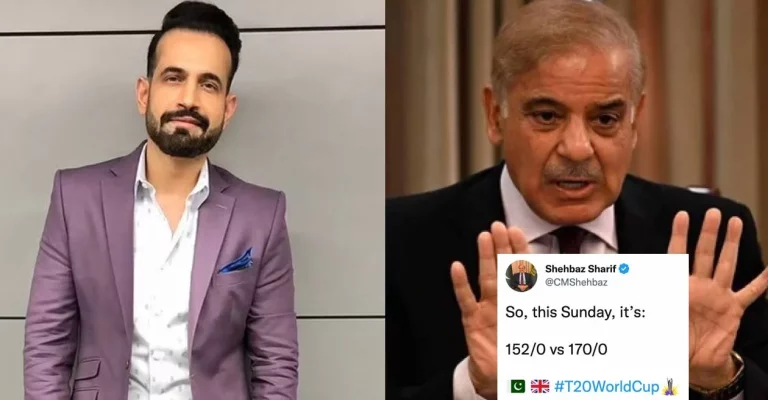Irfan Pathan vs Shehbaz Sharif: In the often heated arena of international cricket, social media can amplify rivalries and controversies. Such was the case after India’s loss to England in the T20 World Cup 2022 semifinal. Pakistan’s Prime Minister Shehbaz Sharif took to Twitter to mock the Indian cricket team. However, former Indian cricketer Irfan Pathan had a poignant response that turned the tables on the situation.
Firstly, Shehbaz Sharif’s tweet directly compared Pakistan’s victory over India in 2021 to England’s win over India in 2022. He used the scores of the matches to throw shade at the Men in Blue. Yet, his tweet was not received well, not just in India but also among sportsmanship-loving cricket fans worldwide. Many saw it as an unnecessary political jab at a moment when sports should have transcended borders.
However, Irfan Pathan, a former speedster for Team India, gave a fitting reply. He not only stood up for his team but also highlighted a critical perspective about sportsmanship and governance. In his response, he made it clear that while India takes pride in its victories, it doesn’t revel in the losses of others. This comment underlined a significant difference in attitude, and in doing so, it was a subtle yet effective critique of Sharif’s focus at a time when leaders should be concerned about their nation’s well-being.
He tweeted: “Aap mein or hum mein fark yehi hai. Hum apni khushi se khush or aap dusre ke taklif se. Is liye khud ke mulk ko behtar karne pe dhyan nahi hai.”
Aap mein or hum mein fark yehi hai. Hum apni khushi se khush or aap dusre ke taklif se. Is liye khud ke mulk ko behtar karne pe dhyan nahi hai.
— Irfan Pathan (@IrfanPathan) November 12, 2022
Importantly, Irfan Pathan’s words transcended the context of a cricket match. They touched on the broader theme of leadership and priorities. Essentially, Pathan raised an implicit question: Should a leader of a country be more concerned with gloating over a rival’s defeat or focus on his own nation’s issues?
ALSO READ Video: Rashid Khan Rattles Dasun Shanaka’s Stumps In Asia Cup 2023 Clash
Consequently, the tweet garnered massive support from Indian fans and also cricket enthusiasts who value sportsmanship. Pathan’s retort was not just a defense of the Indian cricket team but a call for a more respectful and focused form of leadership. Moreover, his reply reverberated with a sentiment that many share: that the purpose of sports is not just to win, but to build bridges between communities and nations.

